If your website is outgrowing the traditional hosting service you’ve been using for years, cloud web hosting may be exactly what your business needs. With cloud hosting, your data is distributed across a virtual network of servers – a cloud environment – rather than on a single server.
In this buying guide, we explain what cloud hosting is and how it works. We’ll also review the 10 best cloud web hosting providers on the market today to help you decide which one to try.
Table of Contents
Read on for detailed reviews of each service and start comparing features and prices.
Cloud hosting works a little differently than other popular types of hosting, such as shared hosting, VPS (virtual private server) hosting or dedicated server hosting.
Each host also does things a little differently. Following the comments is a brief guide to help you evaluate each cloud hosting option.
Best Cloud Hosting Services for 2026
- Kamatera – Best for affordable versatility
- Hostinger – Most bang for your buck
- Scala Hosting – Best cloud hosting for custom resource allocation
- Cloudways – Best customizable managed cloud hosting
- HostGator– Best cheap cloud web hosting
- Nexcess – Best cloud hosting for ecommerce sites
- DreamHost– Best cloud hosting for developers
- SiteGround – Best cloud hosting for scaling resources
- A2 Hosting – Fastest cloud web hosting
- InMotion – Best cloud hosting for small businesses
1. Kamatera — Best for Affordable Versatility

Kamatera has been in the IT business since 1995 and has grown into a global provider of cloud service platforms that works with startups to enterprise-level organizations.
One of Kamatera’s most attractive features comes before you pay a cent for its services: a full 30-day free trial. The free trial is available for all cloud-based products and requires no contract or commitment.
Free trial users get full access to Kamatera’s cloud management platform, a designated account manager, and 24/7 technical support, and includes the following:

Kamatera has a 99.95% uptime guarantee, but all the speed tests I’ve seen have shown 100% uptime. Couple that with affordable rates and instant scalability and flexibility and you get a fantastic VPS cloud hosting experience.
Kamatera has 13 data centers worldwide, including one in Canada (Toronto), three in the United States (New York, Texas, California), three in Europe (Netherlands, Germany, UK), one in Asia (Hong Kong), and five in Israel (Petach Tikva, Rosh Haayin (2), Tel Aviv, Haifa). All data centers are AICPA SOC 2 Type II or higher compliant and each and every component is backed up in parallel, including the main power supply.
Developers and other experienced IT professionals will love the performance and customization options, which include a choice of 60 operating systems, RAM, processors, storage, IP address, and more.
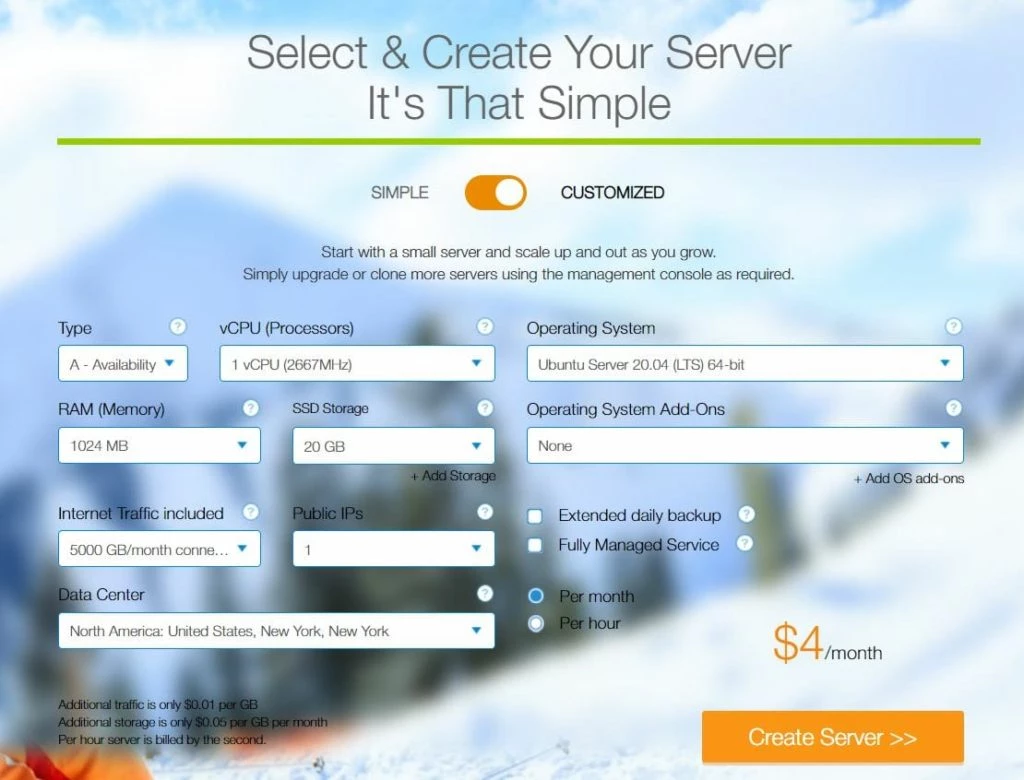
It is important to note that Kamatera is not incredibly beginner-friendly at first glance. There are no drag-and-drop builders and cPanel is a $20 monthly add-on. But with 24/7/365 customer support and an intuitive, easy-to-use control panel, even beginners will be able to use it.
Of course, if you want a more hands-free cloud hosting experience, Kamatera offers fully managed hosting at an additional cost.
Here are some of the features you get with Kamatera’s VPS cloud hosting servers:
Kamatera does not offer shared hosting or domain registration services, although you do get free automatic SSL certificates with each server.
Kamatera’s pricing is straightforward. It’s a true pay-as-you-go system, where you can start with just what you need right now and then scale as needed. Add CPU, RAM, load balancers and more from your control panel and it will be available immediately. Plus, you’ll only be charged for what you actually use.
Here are some of the prices:
Kamatera is a great cloud hosting option for anyone looking for extreme versatility and flexibility at an affordable price. And with the generous 30-day free trial, you can test it out in its entirety to make an informed decision on whether it’s the right provider for your business.
2. Hostinger — Most Bang for Your Buck

Hostinger is known for high-quality web hosting at competitive prices. With plans starting at just $9.99 per month, Hostinger is one of the most affordable options on the market.
This low rate requires a contract. But you can use it to host up to 300 sites for less than $10 per month.
It’s hard to find a better bargain in the cloud hosting space. When you combine that price with Hostinger’s 99.9% uptime guarantee and fast speeds, it’s easy to see why so many sites turn to Hostinger for cloud hosting.

You might think that the low price would impact Hostinger’s customer service. But you’d be wrong. These are fully managed plans with 24/7 support. Hostinger also handles all of your server uptime, monitoring and daily backups.
Hostinger’s dedicated IP is another feature that separates them from the crowd. You’ll get a free dedicated IP with every cloud hosting plan, which is an incredible value.
The plans come with hPanel control panels that are intuitive and easy to use. So you’ll get the hang of it fairly quickly, even if you’re new to this type of dashboard.
Here’s a quick rundown of the plans and pricing.
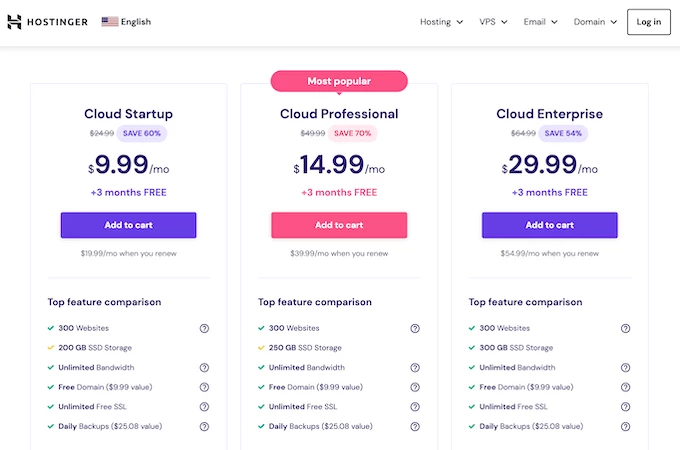
The Hostinger cloud starts at $9.99 per month. Just keep in mind that this is a promotional rate that will go up at renewal, which is pretty standard in the web hosting industry.
It’s also worth noting that the longer you sign up for a Hostinger cloud plan, the better deal you get at renewal. You can lock in promotional rates for up to four years and then get a discount along the way.
Although HostGator has cheaper cloud plans than Hostinger, you won’t get as much RAM with HostGator, and you’ll lose the dedicated IP and automated daily backups.
That’s why Hostinger is the best value when it comes to cloud hosting. You’ll get a ton of benefits for such an affordable price.
Hostinger also backs its plans with a 30-day money-back guarantee. So you can try it risk-free. Contact Hostinger for more information.
3. Scala Hosting — Best for Custom Resource Allocation
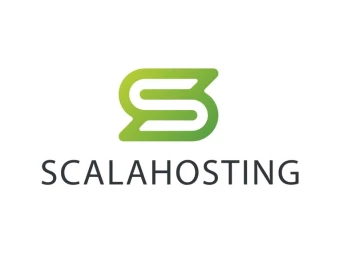
Scala Hosting offers cloud VPS for customers, bringing granular VPS management along with the flexibility and scalability of cloud hosting.
But Scala really rises above the rest in terms of customization. It is one of the only hosting providers that allows you to set up a precise, customized set of resources before you even sign up.
While they offer preconfigured hosting plans starting at $14.95 per month, Scala allows you to create a custom hosting package with the perfect combination of memory, storage and processing power to meet your specific needs.
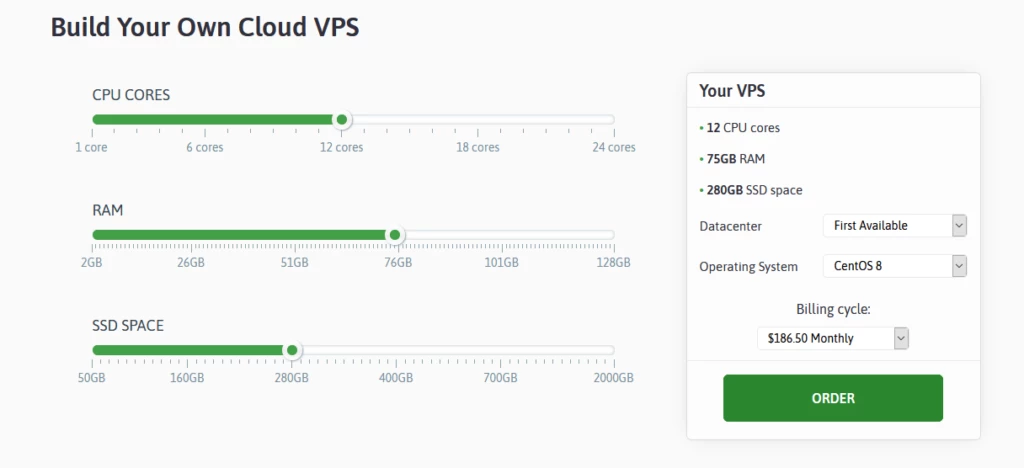
Best of all, it’s very easy to do. Scroll down on the main Scala Cloud VPS page, and you can move the sliders for each up and down to your heart’s content. The minimums and maximums depending on whether you choose Scala’s managed or self-managed options.
Scala’s pre-set managed cloud VPS plans:
Scala’s self-managed cloud VPS is completely “build it yourself” and starts at:
There are also a bunch of additional add-ons you can purchase for self-managed cloud hosting, including LiteSpeed domains, WHMCS licenses, cPanel licenses and more.
Any of these allow you a wide range of possible resource allocation options and Scala doesn’t really gouge you for adding more in any category. You don’t get punished for scaling to any extent.
You can also choose your preferred data center location, as well as your preferred control panel (on managed plans) or operating system (on self-managed plans).
Another remarkable advantage of Scala is its free site migration service. So if you are currently using another hosting provider, you can switch to Scala without any hassles or headaches.
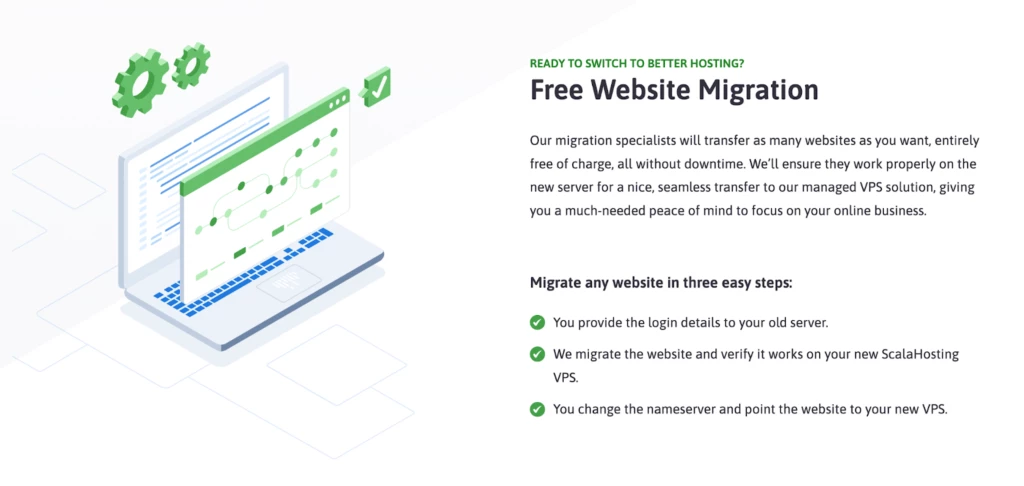
So, Scala Hosting is an excellent choice for anyone who knows exactly what they need from their hosting provider, especially if you know of a custom configuration that would benefit your site but isn’t commonly offered by other providers (like if you just want blazing speed without a ton of storage space).
And pricing remains competitive despite all the customization you’re allowed. When you get to the higher ranges of resources, Scala’s custom plans are more than competitive with the high-end cloud hosting offerings of others, even surpassing them in price and flexibility.
Get exactly what you need, scale freely and reap the benefits of a precise combination of resources by choosing Scala Hosting today.
4. Cloudways — Best Customizable Managed Cloud Hosting

Cloudways distinguishes itself from many other cloud-based web hosting services with its flexibility and customizable options, along with lightning-fast speeds and 24/7/365 support.
In terms of options, you’re unlikely to find a host with more of them. As a managed cloud hosting provider, Cloudways takes care of server management for you. When you get started, you select your CMS and you can be up and running in moments. Cloudways prides itself on simplicity with exceptional performance.
CMS options include:
For plans and pricing, rates depend on several factors, including selecting from among seven data center options (and locations) and what level of RAM, processor cores, storage and bandwidth you need. The data center options are:
Plans run the gamut of prices. The cheapest is $12 per month, including standard DigitalOcean hosting charges, with 1 GB of RAM, 1 processor core, 25 GB of storage and 1 TB of bandwidth.

The most expensive one costs $274.33 per month, including AWS hosting charges. That plan includes 16 GB of RAM, 4 vCPUs, 20 GB of storage, and 2 GB of bandwidth.
What’s more impressive is the pay-as-you-go pricing. Cloudways offers some hourly packages that actually only charge you for the time you use, rather than paying for an entire month, even if you cancel after 2 weeks. Of course, Cloudways also offers monthly plans.
All plans include 24/7/365 support, free SSL, CDN add-on, free migration, unlimited application installation, 24/7 real-time monitoring, automatic backups, advanced caches, auto-healing, and much more.
Cloudways doesn’t skimp on security, either. Dedicated firewalls, free one-click SSL installation, IP whitelisting, 2FA, and bot protection are just some of the security features you get.
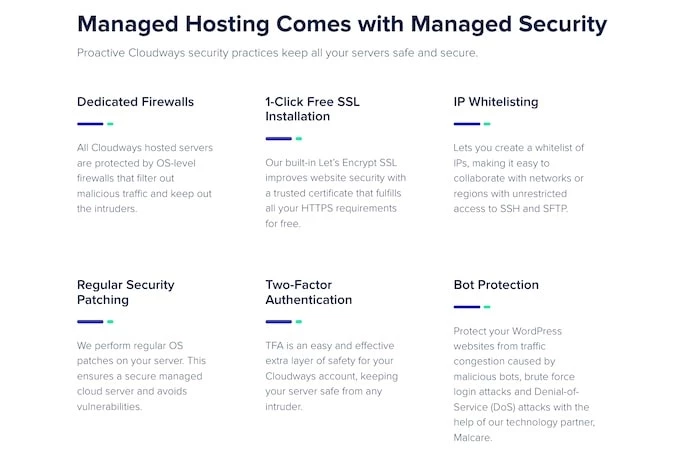
While Cloudways isn’t perfect – it lacks a cPanel and doesn’t offer domain registration – it offers a wealth of add-ons and integrations to make it work for your needs. Add-ons include Rackspace email hosting, Gmail SMTP, application migration and more.
You can try Cloudways for free with a three-day free trial that requires no credit card to get started.
5. HostGator — Best Cheap Cloud Hosting
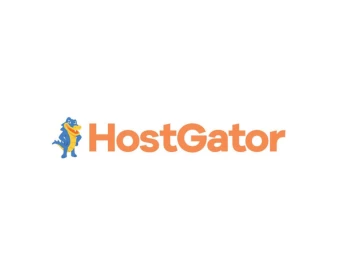
HostGator offers some of the most cost-effective cloud hosting on the market today. They are undoubtedly the most affordable options on this list.
Let’s take a look at the three basic cloud hosting plans offered by HostGator:
Hatchling Plan
Baby Plan
Business Plan
These rates are for 36 month contracts. They are 45% cheaper than the actual price, which you will end up paying when you renew your contract.

All HostGator cloud hosting plans come with a free SSL certificate. The Business plan comes with a dedicated IP, free SEO tools and a free domain as well.
Not only are they affordable, but they don’t sacrifice quality either. HostGator’s control panel makes it easy for you to monitor your website’s performance. You can quickly view data related to page speed, uptime, reach, and much more.
Scaling your server resources is also simple. This can be done with a single click, with no downtime, reboots, or data migrations. Read more about their services in my full HostGator review.
6. Nexcess — Best for Ecommerce Sites

Nexcess is a web hosting solution offered by the good folks at Liquid Web. We’ve featured them before for their great hosting services, and Nexcess is no exception.
Their main offerings are managed Magento, WooCommerce, and WordPress hosting (along with a few other CMSs). That makes them perfect for ecommerce websites looking to grow.
But they also have an outstanding cloud hosting service, which is ideal for growing businesses. The specific plans vary depending on what their CMS is, they offer a wide variety of them.
That makes Nexcess perfect for growing companies that plan to rapidly scale their growth-and are looking for a cloud host that scales with them.
One tool I really like is Nexcess Cloud Accelerator. It’s an additional layer in front of the cloud stack that increases load times. That means your site will be nice and fast for your customers.
They also have a dedicated support team on call 24/7 to help your business in the face of any technical issues, or if you want to switch plans.
Here’s a look at the plans they offer:
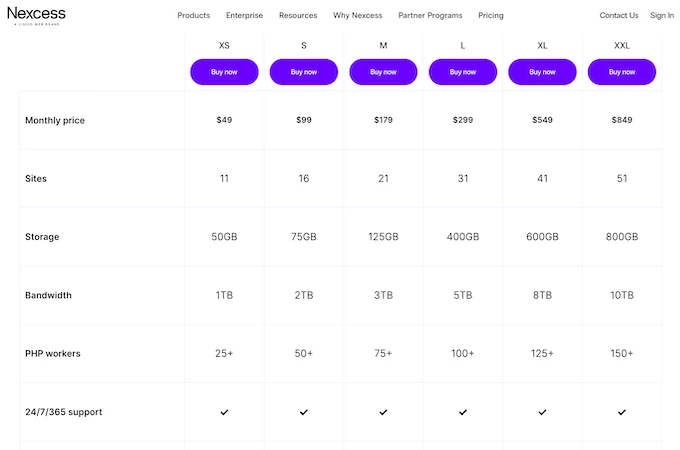
Everything is ready for online business. You’ll be ready to accept payments securely and all customer information will be kept safe.
Traffic spikes? No problem. Nexcess cloud hosting allows you to scale for a limited period of time if you need to. You won’t be forced to pay more than you need to deal with peak times.
Nor will you waste time making sure your site is up and running. Nexcess handles everything on the backend so you can concentrate on selling.
Set up your store with Nexcess cloud hosting today.
7. DreamHost — Best for Developer Projects

DreamHost has the easiest cloud setup in the industry. You can get your servers in the cloud live in less than 30 seconds.
That said, DreamHost’s cloud is better for developers than for normal users. It has server options that are made for databases, web applications, and running tests in addition to websites.
You can continue working with the DevOps tools you are already using. DreamHost also gives you full root access for total control over your cloud servers.
The best thing about DreamHost is that you only pay for what you actually use. You will be charged for resources on an hourly basis based on the size of your server.
The 2 GB server is the recommended option for web sites.
You will not be billed anything when you sign up. Instead, you will be billed based on your monthly usage.
The only area where DreamHost falls short that I found in my comprehensive review of DreamHost web hosting services is their customer service. You can only contact customer service via email or live chat, which is only available for 16 hours a day. So if you prefer phone support or need help in the middle of the night, you’re out of luck until the next morning.
8. SiteGround — Best for Scaling Resources

SiteGround offers fully managed, high-performance cloud hosting based on Google’s cloud infrastructure. This means you get automatic updates, tools for easy website management, optimized servers, and a handy auto-scaling tool to keep your site up and running even with unexpected traffic spikes.
These plans are fully managed. That means they take care of your account for you.
SiteGround takes care of the IT for your hosting. This allows you to focus on other areas of your website. Plus, Siteground’s speed and performance are excellent. Each cloud hosting plan has the SG Optimizer plugin pre-installed and a unique PHP configuration to increase speed.
SiteGround cloud plans come equipped with an Auto Scaling tool, which prevents traffic loss and downtime. You can also add CPU and RAM at any time with a single click in the admin settings.
With SiteGround, you can fully configure your own cloud and plan based on the resources you need. For example, they have six data centers on four continents to choose from, so you can pick the one that’s closest to your users. Here’s a look at their plans:
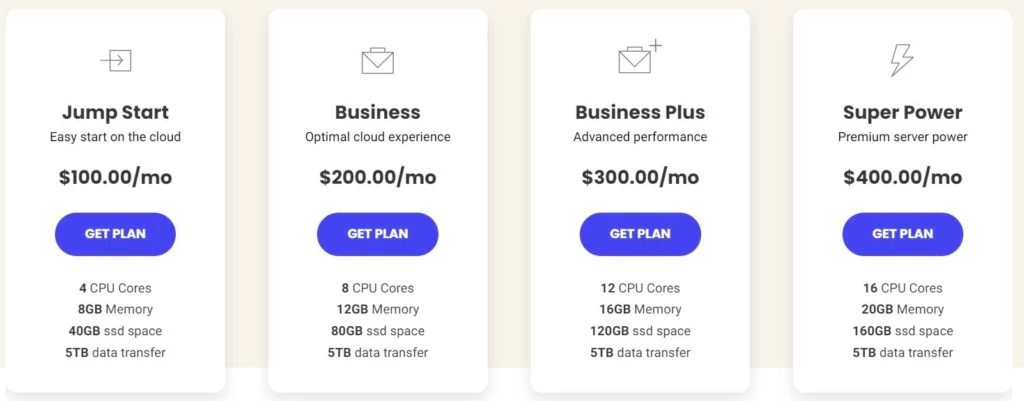
The Business or Business Plus plans should be more than enough resources for most of you, so that’s what I would recommend starting with. As your traffic increases, you can always scale as needed.
You’ll also benefit from webmaster tools like a dedicated IP, free CDN, free SSL, daily backups and a private DNS. Check out my in-depth SiteGround web hosting review to learn more about their services in general.
9. A2 Hosting — Fastest Cloud Web Hosting

A2 Hosting offers some of the fastest hosting services around.
Although they do not offer traditional cloud hosting services, they do offer VPS hosting solutions with dedicated server resources. With a turbo plan from A2, you will benefit from a fully optimized hosting solution that is 20 times faster than traditional cloud packages.
The plans start at $5, $10 and $15 per month, respectively. But you’ll only pay for the resources you use based on how you set up your cloud servers.
If you want to have cPanel, it’s an extra $19.95 per month and is not available with the lowest-priced plan.
As I mention in my full review of A2 web hosting services, they offer a 99.9% uptime promise as well as an anytime money-back guarantee. Although there are some contingencies to both, so be sure to read the fine print in your contract.
If customer support is important to you, then you will definitely be pleased with A2’s 24/7/365 guru support team.
This cloud hosting provider is ideal for those of you who want unmanaged cloud hosting with ultra-fast page load speed.
10. InMotion — Best for Small Businesses
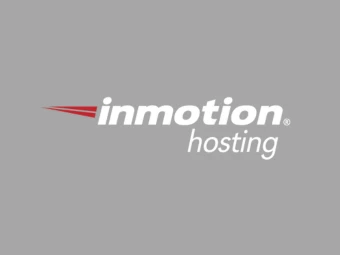
InMotion offers some of the most underrated cloud hosting services out there.
They have cloud hosting solutions for everyone.
In total, InMotion has 10 different plans and pricing tiers for cloud hosting, which is the most I’ve seen offered by any provider.
For website owners, you’ll want to focus on small business plans. InMotion makes it easy for you to scale your resources as your site grows, as I found in my full review of InMotion hosting services.
One thing I really like about Inmotion is that their customer service is really top-notch. They offer 24/7 support by phone, chat, or email. Monitoring and ticketing also happen around the clock.
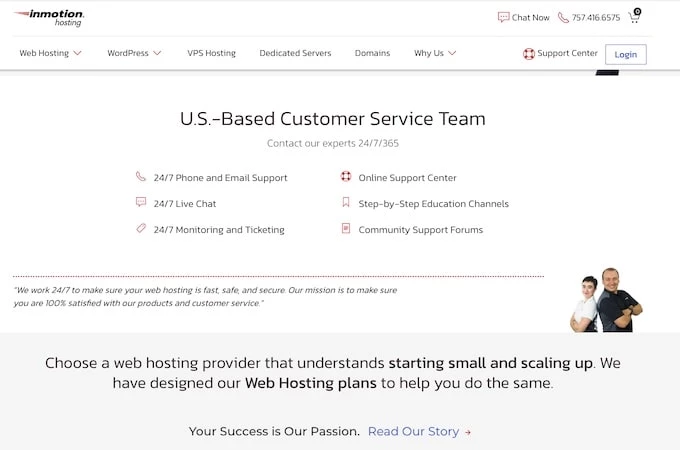
You also get a resource monitoring control panel, free automatic backups, fast provisioning, and full snapshots of your servers. InMotion offers a free SSL and a free cPanel license with all your cloud business plans.
What Is Cloud Hosting?
Typically, your site is hosted on a single server. This can be your own dedicated server or one that you share with other websites.
With cloud hosting, your web hosting is not connected to a physical location. Your website resources are maintained on multiple virtual servers in the cloud.
Each cloud server is responsible for a specific set of tasks. If one of the cloud servers fails or goes down, the others will automatically take over to provide the necessary resources.
Your website will continue to run smoothly with cloud hosting, even if there is a problem with one of the servers.
With cloud hosting, your website benefits from higher uptime rates and will not be as susceptible to unplanned downtime.
With a single physical server, you are basically putting all your eggs in one basket. This is a big risk when it comes to something as important as your website.
In addition to eliminating the potential problems inherent with one server, cloud hosting will keep your site stable, even as your traffic increases.
Cloud hosting is also extremely easy to set up. For those of you who want to start cloud hosting right away, it can be a faster deployment option than something like a dedicated server or a shared server.
Cloud hosting has a few different benefits for those who choose to use it, including:
Who Is Cloud Hosting For?
Cloud web hosting is ideal for medium to large businesses and rapidly growing websites. Cloud web hosting allows businesses to scale quickly. That’s great for growing businesses.
Most cloud hosting plans have flexible pricing options, which means you only pay for the resources you are actually using.
If you anticipate random traffic increases or a steady increase in website traffic over the next few years, cloud hosting is the perfect option for you.
However, cloud web hosting is not right for every business.
For those of you who have a small personal website, a small blog or a micro business, you probably don’t need to use cloud hosting if there is no growth in the future. A shared hosting plan is fine for those types of websites.
Check out our cloud vs shared hosting comparison to delve into more detail.
When you are ready to grow your website, you should consider upgrading to a cloud hosting plan instead of a VPS. While a virtual private server will be able to offer sufficient server resources, a cloud plan is usually more cost-effective.
Enterprise-level websites with the need to customize their server configuration would benefit from a dedicated hosting plan rather than a cloud solution.
Any website with more than 50,000 monthly visitors is a viable candidate for cloud hosting. It is the perfect option for larger websites that cannot afford any downtime.
How to Find the Best Cloud Hosting Plan For You
Not all cloud hosting plans are the same. Some hosting providers offer different features and advantages compared to others.
When you are evaluating cloud web hosting, these are the factors you should consider.
Scalable Resources
You need to make sure you sign up for a web hosting plan with sufficient bandwidth, storage, and disk space. To do this, you need to know how much traffic you are going to receive. But new websites face a common dilemma when looking for a hosting plan.
They have to decide if they want to get as much bandwidth as possible, even if they’re not going to exceed those limits. Or should they start with a lower bandwidth plan and upgrade when their traffic starts to increase?
- Cloud hosting solves this dilemma.
Since your website is hosted on multiple servers, you won’t have to worry about over-bandwidth. If one server is maxed out, you can always pull resources from another.
Look for a cloud hosting plan that allows you to easily manage and configure your server resources in real time.
Here’s an example of what this looks like at HostGator Cloud, which is a provider we reviewed earlier in this guide.
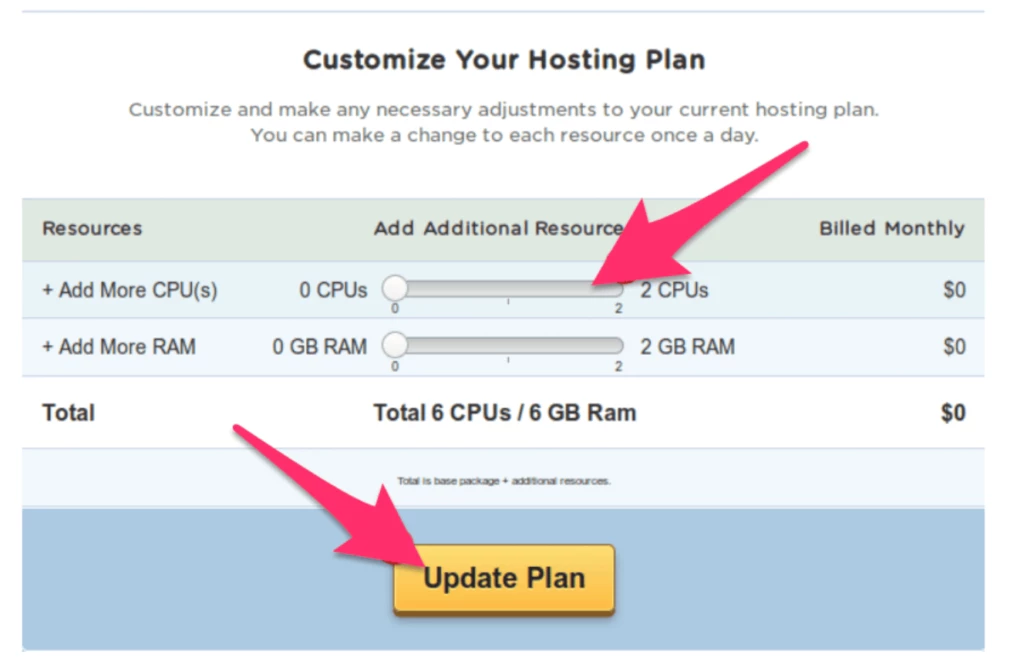
I would recommend a cloud hosting plan that allows you to scale your server resources without needing approval from the provider. This can be managed from the admin panel.
Price
Most traditional hosting plans require you to pay a fixed monthly fee. You will be charged this amount even if you do not use all the server resources.
But cloud hosting is much more flexible in terms of pricing. So I would look for a hosting provider that charges you based on the resources you actually use.
Here’s an analogy. Let’s say you go to a free buffet, where food options can also be purchased a la carte. The buffet price is $20 per person, which is the most you’ll have to pay, regardless of how much you eat.
But if you only eat $10, wouldn’t it be nice to get $10 back?
This is how some of the best cloud hosting plans are structured.
This relates to our earlier point about being able to scale your resources on demand. For example, let’s say you just built a bunch of new backlinks and you’re waiting for a particular blog post on your website to go viral.
Instead of upgrading your entire plan (which you would have to do with other types of web hosting), you can increase the resources needed during that traffic spike and go back to normal when the traffic stabilizes.
In this case, you will only pay for the actual server usage during the traffic spike. Here is an example of this pricing structure from another provider on our list, DreamHost.
As you can see, pricing is based on usage. Each plan has a maximum monthly rate. Even the fine print at the bottom of the page indicates that you will only be billed for what you use.
So look for a hosting provider that offers a similar pricing structure.
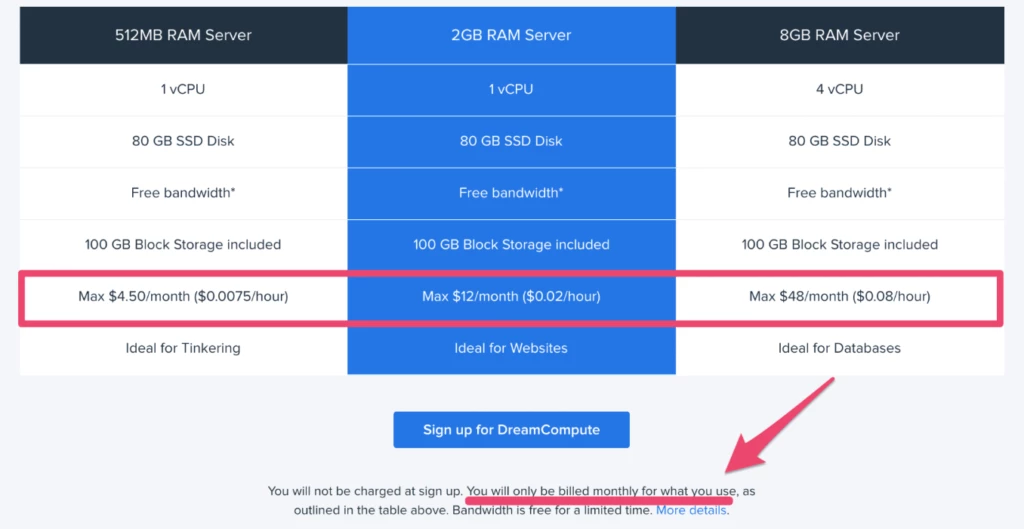
Speed and Performance
If your hosting plan doesn’t offer the best performance, then it’s a pretty bad hosting plan.
Most cloud hosting servers will increase the capacity of your web site, which increases the loading speed of your pages.
Cloud hosting does not put as much strain on a singular server. If your website has a lot of resource-intensive data, such as videos, images and other multimedia content, then cloud hosting is something you need to take advantage of.
Look for a cloud hosting plan that delivers content from the nearest remote server. This will ensure that all of your loading times are as fast as possible.
At the end of the day, your website visitors don’t care what type of hosting plan you are using. They just want your site to be responsive and load quickly.
By prioritizing things like uptime and loading speed with cloud hosting, your website will ultimately perform better from a user’s point of view.
Security
No matter what type of web hosting plan you have, website security always needs to be a priority.
Fortunately, cloud hosting is known to be very secure. That’s because your website is isolated from any potential problems with a physical server. Everything is being handled remotely, which would not be the case if you were relying on a singular server that is hosted locally.
If a local server were to be compromised, your website would be at risk. On the other hand, if a server on your cloud network was hacked, failed or suffered a system overload, your website would continue to function with no downtime or delays.
Look for a web host that offers any additional security protection as an incentive with its cloud hosting plan.
Conclusion
Cloud web hosting is a great solution for growing websites. If your shared plan can no longer accommodate your site’s needs, then you should consider switching to a cloud solution, as it can give you more resources, space and performance power.
Most websites can benefit from cloud hosting. The greater flexibility, scalability and resiliency make it ideal for businesses that need on-demand hosting resources. It is a good choice for interactive sites, online stores, web applications and IoT deployments.
FAQs
Should I host my website in the cloud?
Is cloud web hosting secure?
How much does it cost to manage a website in the cloud?
Unlike other hosting plans that are billed at a flat monthly rate, most cloud web hosting plans charge based on the server resources actually used. As you increase server resources, such as CPU and RAM, based on traffic, your cost will increase. Conversely, your rates will go down in months when you have less traffic.
Is cloud web hosting reliable?
Websites that rely on cloud web hosting will benefit from higher update rates and fewer interruptions from unexpected server problems. This is much more reliable than shared web hosting and even dedicated server hosting, where a single point of failure can cause an outage.
Is cloud hosting better than shared hosting?
Although cloud hosting is more expensive than shared hosting, there are many affordable basic plans that make it a viable option for new and growing websites. Shared servers do not offer the same on-demand resource allocation options and are more likely to experience performance issues when traffic increases.
To read more similar articles, click here
Thanks for visiting our Website. If you appreciate our work, kindly show us some support in our comments section. 🙂







